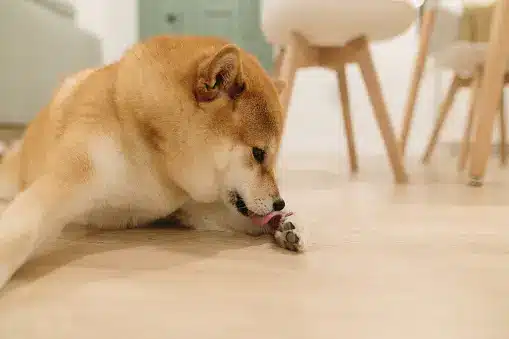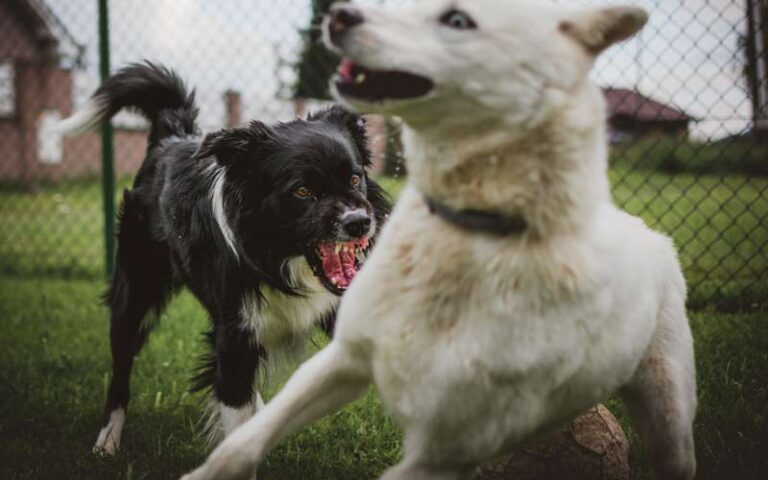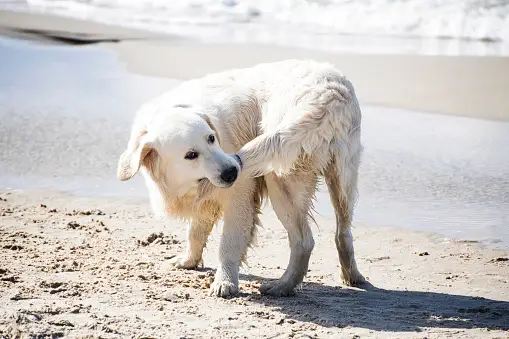Have you ever noticed your dog chewing on their paws? It’s a common behavior that can actually signal a few different things. Understanding why your furry friend does this can be essential for their health and happiness. Whether it’s due to allergies, anxiety, or just plain boredom, there are steps you can take to help them out. So, let’s uncover the reasons behind this paw-chewing habit and explore what you can do about it.
Reasons why dogs chew their paws
- Itchy Skin: Just like humans, dogs can experience itchy skin due to allergies, parasites, or skin infections. When their paws itch, they may resort to chewing as a way to relieve the discomfort. If you notice your dog constantly chewing their paws, it could indicate an underlying skin issue that needs attention from a veterinarian.
- Boredom or Anxiety: Dogs are intelligent creatures that need mental and physical stimulation to stay happy and healthy. If they’re bored or anxious, they may develop repetitive behaviors like paw chewing as a way to cope. Providing your dog with plenty of exercise, playtime, and mental enrichment can help reduce boredom and anxiety-related behaviors.
- Pain or Injury: Sometimes, dogs chew on their paws because they’re experiencing pain or discomfort. They may have a splinter, cut, or foreign object lodged in their paw, causing them to lick and chew at it in an attempt to alleviate the pain. Regularly inspect your dog’s paws for any signs of injury or irritation, and consult with your vet if you notice anything unusual.
- Allergies: Just like humans, dogs can be allergic to certain substances, such as pollen, grass, or certain foods. Allergic reactions can manifest as itchy skin, leading to paw chewing as a way to relieve the irritation. If you suspect your dog has allergies, your vet can help identify the allergen and recommend appropriate treatment options.
- Boredom: If a dog doesn’t have enough to do, they might start chewing their paws just to pass the time. Dogs need mental and physical stimulation, so it’s important to keep them engaged with toys, games, and activities.
- Environmental Irritants: Dogs can encounter various irritants in their environment, such as pesticides, cleaning chemicals, or even certain types of grass. These irritants can cause irritation to their paws, prompting them to chew in an attempt to soothe the discomfort. Keeping your dog away from potentially harmful substances and rinsing their paws after walks can help prevent irritation.
- Habit: In some cases, paw chewing can become a habit for dogs, especially if they’ve been doing it for a long time. Breaking this habit may require patience and consistency, along with identifying and addressing any underlying causes contributing to the behavior.
Stop dogs from chewing their paws
If your dog is constantly chewing their paws, it’s important to take action to prevent any potential health issues. Here are some preventive measures you can take:
Regular grooming and checking for irritants
One of the main reasons dogs chew their paws is due to irritation or discomfort. Make sure to regularly groom your dog, keeping their fur trimmed and clean. Check for any signs of irritants such as thorns, burrs, or cuts on their paws. Keeping their paws clean and free from irritants can help prevent excessive chewing.
Provide mental and physical stimulation
Dogs may chew their paws out of boredom or lack of stimulation. Make sure your dog is getting enough mental and physical exercise to keep them entertained and prevent them from resorting to chewing their paws. Interactive toys, walks, and playtime can help keep your dog’s mind and body active.
Consulting a veterinarian
If your dog continues to chew their paws despite preventive measures, it’s important to consult a veterinarian. They can help determine the underlying cause of the paw chewing and provide appropriate treatment. Your vet may recommend allergy testing, medication, or other interventions to help alleviate your dog’s discomfort and prevent further paw chewing.
Home remedies to soothe dogs’ paw chewing
- Foot Soaks: Soaking your dog’s paws in a solution of warm water and Epsom salt can help soothe irritated skin and reduce inflammation. Epsom salt has natural anti-inflammatory properties that can provide relief from itching and discomfort. Make sure the water is not too hot, and soak your dog’s paws for about five to ten minutes.
- Apple Cider Vinegar: Diluted apple cider vinegar can be used as a natural antiseptic and antifungal solution to help relieve itching and irritation on your dog’s paws. Mix equal parts of apple cider vinegar and water, and use a clean cloth or cotton ball to apply the solution to your dog’s paws. Avoid applying it to any open wounds or irritated areas.
- Oatmeal Bath: Oatmeal is known for its soothing properties and can help relieve itching and inflammation on your dog’s skin. You can make a homemade oatmeal bath by blending oats into a fine powder and adding it to your dog’s bathwater. Soak your dog in the oatmeal bath for about 10-15 minutes to help alleviate paw discomfort.
- Coconut Oil: Coconut oil contains medium-chain fatty acids that have antimicrobial and moisturizing properties, which can help soothe and nourish your dog’s paw pads. Apply a small amount of coconut oil directly to your dog’s paws and massage it gently to moisturize and protect the skin.
- Aloe Vera Gel: Pure aloe vera gel can help calm irritated skin and promote healing. Make sure to use an aloe vera gel that is specifically formulated for pets and does not contain any additives or preservatives. Apply a thin layer of aloe vera gel to your dog’s paws and allow it to dry before letting your dog lick it off.
- Regular Grooming: Keeping your dog’s paws clean and free from debris can help prevent irritation and infection. Regularly trim the hair around your dog’s paw pads to reduce the risk of trapping dirt and moisture, which can contribute to itching and paw chewing.
- Dietary Supplements: Omega-3 fatty acids, such as fish oil, can help support healthy skin and coat in dogs. Adding a fish oil supplement to your dog’s diet may help reduce inflammation and improve overall skin health, which can help alleviate paw chewing caused by allergies or skin conditions.
By incorporating these home remedies into your dog’s routine, you can help alleviate their paw chewing and provide them with relief from any discomfort they may be experiencing.
It’s really important to know why dogs chew on their paws to keep them healthy and happy. There could be reasons like allergies, feeling anxious, or just being bored. When pet owners understand these reasons, they can do things to help, like talking to a vet, changing their food, or giving them more things to do. The goal is to make sure our dogs don’t chew on their paws because a dog that’s happy and healthy won’t need to do that.






